What Do Employers Assess During Social Media Screening?
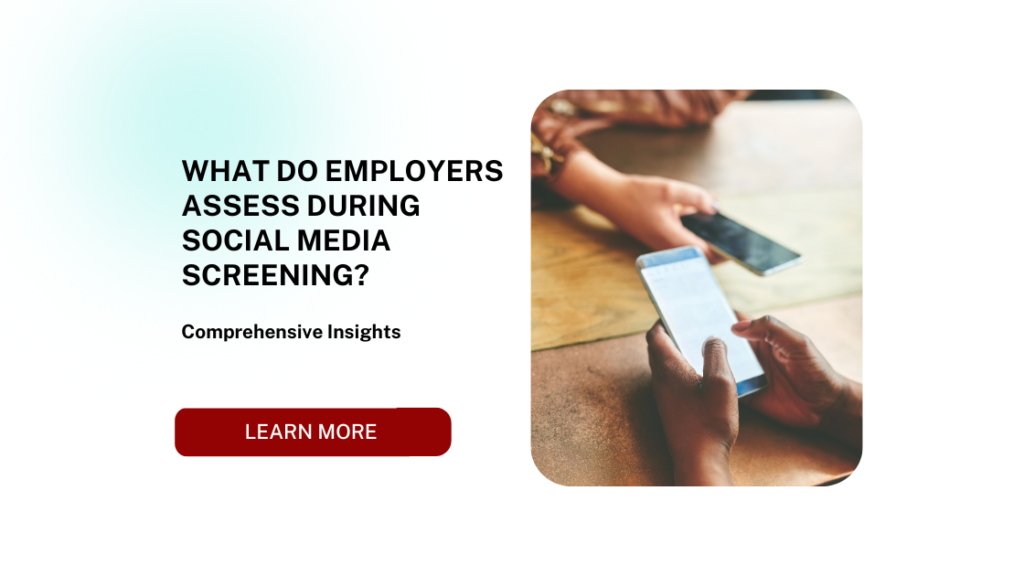
What Are Employers Looking for When They Conduct a Social Media Screening?
Social media has become a powerful tool in the hiring process, offering employers insights into candidates’ personal and professional lives that go beyond resumes and interviews. Social media screenings have grown in popularity as a means of evaluating a candidate’s cultural fit, professionalism, and potential risks. But what exactly are employers looking for, and how does this process impact job seekers?
In this article, we’ll delve into what social media screening entails, why employers conduct these checks, and the specific factors they evaluate.
Understanding Social Media Screening by Employers

What Is Social Media Screening?
Social media screening refers to the practice of reviewing a job applicant’s publicly accessible social media profiles as part of the hiring process. Platforms such as LinkedIn, Facebook, Twitter, Instagram, and even TikTok are often included in these evaluations. By examining a candidate’s online behavior, employers aim to gather information about their personality, communication style, and alignment with the company’s culture and values.
Unlike traditional background checks, which focus on verifying employment history, criminal records, and educational credentials, social media screenings provide a more personal glimpse into a candidate’s character and behavior.
Why Do Employers Conduct Social Media Screenings?
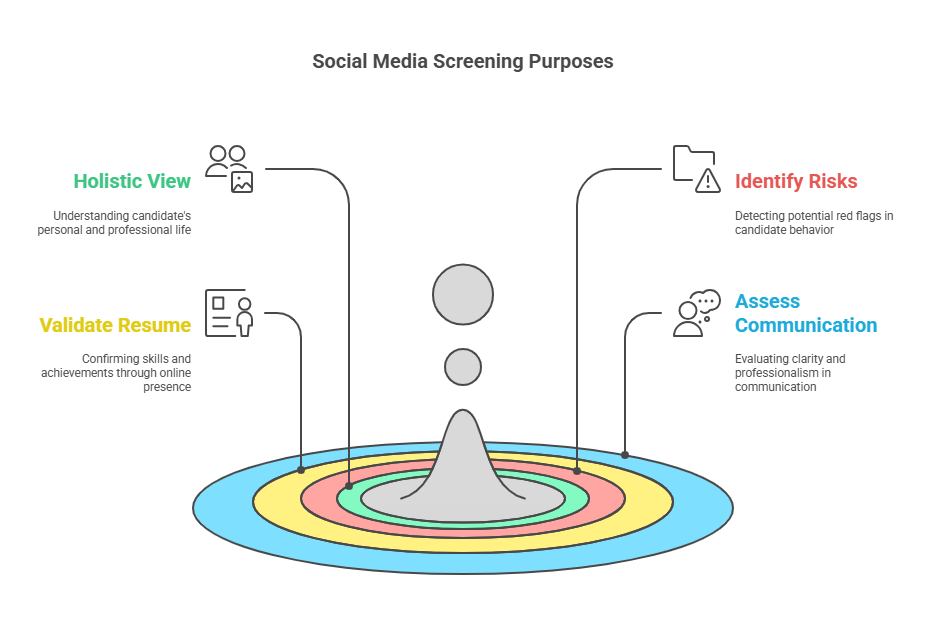
1. To Gain a Holistic View of the Candidate
Resumes and interviews only tell part of the story. Social media can reveal additional aspects of a candidate’s life, including hobbies, interests, and personal values. Employers use this information to determine whether the candidate aligns with their organizational culture.
2. To Identify Potential Risks
Employers are vigilant about protecting their company’s reputation and workplace environment. Red flags such as offensive language, discriminatory remarks, or evidence of illegal activities on social media can signal potential risks.
3. To Validate Resume Claims
Social media can provide evidence that supports or contradicts claims made in a candidate’s resume. For example, endorsements on LinkedIn, project showcases, or published content can confirm a candidate’s skills and achievements.
4. To Assess Communication Skills
A candidate’s ability to express themselves clearly and professionally on social media can indicate strong communication skills, which are essential in many roles.
Key Aspects Employers Evaluate During Social Media Screening
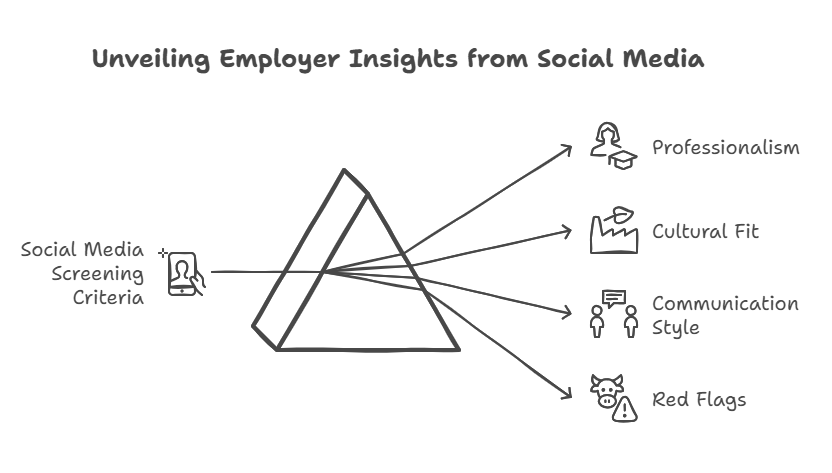
Employers typically focus on the following criteria when conducting social media screenings:
1. Professionalism
- Posts that demonstrate maturity and a professional demeanor.
- Profiles showcasing career-related achievements, such as certifications, presentations, or project highlights.
- Appropriate use of language and tone in posts and interactions.
2. Cultural Fit
- Activities, interests, or causes that align with the company’s mission and values.
- Evidence of team collaboration or leadership in social settings, such as volunteering or organizing events.
3. Communication Style
- Clear, articulate, and respectful communication in posts, comments, and messages.
- Engagement in meaningful conversations related to the candidate’s industry or areas of expertise.
4. Red Flags
Employers are on the lookout for behaviors that could raise concerns, including:
- Discriminatory or offensive content.
- Evidence of illegal activities, such as drug use or theft.
- Complaints or negative comments about previous employers.
- Excessive use of profanity or inappropriate humor.
Common Mistakes on Social Media That Could Impact Employment
Social media screenings can work against candidates if they are not careful about their online presence. Below are some common mistakes that could negatively affect a candidate’s chances:
| Mistake | Impact |
|---|---|
| Posting offensive or discriminatory content | Signals poor judgment and potential workplace conflict risks. |
| Sharing private or sensitive information | Raises concerns about confidentiality and data security. |
| Criticizing previous employers or colleagues | Suggests a lack of professionalism and a potential for workplace discord. |
| Posting evidence of illegal behavior | Indicates a lack of integrity and respect for the law. |
| Inconsistent information across platforms | Creates doubts about the accuracy of resume claims. |
Examples of What Employers Look For
| Positive Indicators | Negative Indicators |
|---|---|
| Posts showcasing industry knowledge or achievements | Discriminatory language or offensive posts |
| Engagement in community or charity activities | Evidence of illegal activities or substance abuse |
| Clear and professional communication style | Negative comments about past employers |
| Consistent information across all platforms | Inconsistencies with resume claims |
Why Social Media Screening Is Gaining Popularity
Social media screening is becoming increasingly common for several reasons:
1. Accessibility of Information
Unlike background checks, social media screenings do not require specialized permissions or processes to access publicly available information. This ease of access makes social media a convenient and cost-effective tool for employers.
2. Comprehensive Insights
Social media provides a well-rounded view of a candidate’s personal and professional life, allowing employers to assess traits that may not be apparent in traditional screening methods.
3. Enhanced Risk Management
By identifying potential red flags early in the hiring process, employers can mitigate the risk of onboarding individuals who may not be a good fit for the company or pose potential liabilities.
Potential Limitations of Social Media Screening
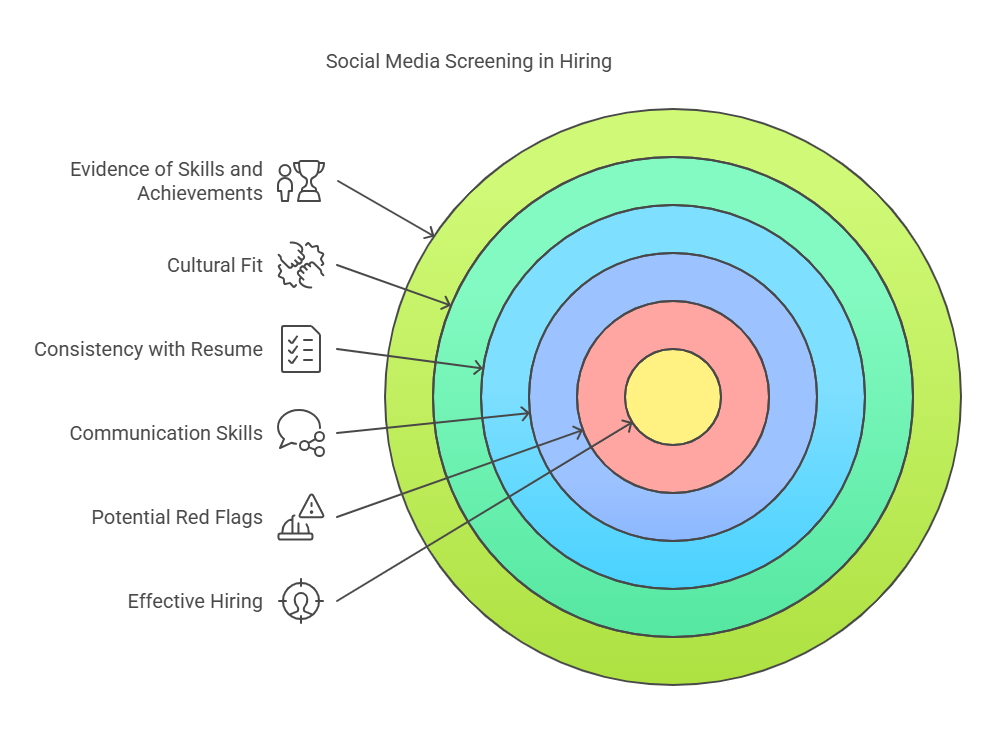
While social media screening offers valuable insights, it is not without limitations:
- Bias Risks: Employers must be cautious not to let personal biases influence their hiring decisions based on a candidate’s social media content.
- Privacy Concerns: Candidates may perceive social media screenings as an invasion of privacy, especially if employers access personal or private profiles.
- Incomplete Information: Public social media profiles may not provide a complete picture of a candidate’s personality or qualifications.
What Employers Specifically Look for During a Social Media Screening
1. Professional Alignment
Employers want to ensure that candidates’ social media profiles reflect their professionalism. They look for posts, comments, and interactions that indicate the candidate is serious about their career and committed to personal and professional growth.
- Examples of Positive Content:
- Sharing industry-relevant articles or news.
- Posting about certifications, awards, or professional milestones.
- Demonstrating networking activities, such as attending industry conferences.
2. Evidence of Skills and Achievements
Social media can serve as a portfolio of sorts, showcasing a candidate’s skills, projects, and accomplishments. For example:
- A marketer’s LinkedIn profile might feature examples of successful campaigns or blog posts.
- A designer’s Instagram page might showcase a portfolio of creative work.
3. Cultural Fit
Employers want to gauge whether candidates align with the company’s values and mission. Evidence of volunteer work, community involvement, or participation in meaningful causes can positively impact a candidate’s impression.
4. Consistency with Resume Claims
Employers compare information on social media profiles with the details provided on resumes. Inconsistencies, such as conflicting job titles or employment dates, can raise red flags.
5. Communication and Interpersonal Skills
Social media provides insight into how candidates communicate and interact with others. Employers favor candidates who express themselves clearly, respectfully, and positively.
6. Potential Red Flags
Employers are also vigilant about behaviors or content that may indicate risks to the workplace. Common red flags include:
- Offensive Content: Posts or comments that are discriminatory, racist, sexist, or otherwise offensive.
- Negative Comments: Complaints about previous employers, colleagues, or customers.
- Evidence of Illegal Activity: Posts showcasing drug use, reckless behavior, or criminal acts.
- Poor Judgment: Inappropriate jokes, excessive profanity, or overly personal content that could reflect poorly on the candidate.
How to Prepare for Social Media Screening
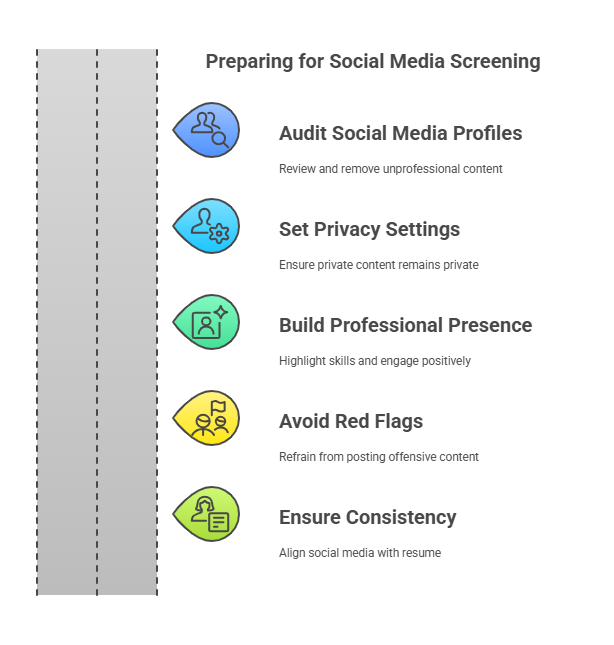
Candidates can take proactive steps to ensure their social media presence creates a positive impression.
1. Audit Your Social Media Profiles
- Review all your social media accounts to identify and remove inappropriate or unprofessional content.
- Use search engines to check what information is publicly accessible about you.
2. Set Privacy Settings Appropriately
- Ensure private content stays private by using robust privacy settings.
- Limit access to personal posts or photos that may not align with your professional persona.
3. Build a Professional Online Presence
- Use LinkedIn to highlight your skills, achievements, and professional affiliations.
- Share articles or content related to your industry to demonstrate expertise and enthusiasm.
- Engage positively with others in your field through thoughtful comments and interactions.
4. Avoid Red Flags
- Refrain from posting anything that could be considered offensive, divisive, or inappropriate.
- Think carefully before commenting on sensitive or controversial topics.
5. Be Consistent Across Platforms
- Ensure that the information on your social media profiles matches your resume, especially regarding job history, education, and skills.
Do’s and Don’ts for Candidates During Social Media Screenings
| Do’s | Don’ts |
|---|---|
| Regularly update LinkedIn with professional milestones. | Post offensive, discriminatory, or inappropriate content. |
| Highlight achievements, certifications, and projects. | Complain about previous employers or colleagues. |
| Share industry-relevant articles and insights. | Display evidence of illegal or reckless behavior. |
| Maintain a respectful and positive tone in comments. | Use excessive profanity or engage in online arguments. |
| Use privacy settings to control personal content. | Post conflicting information that doesn’t match your resume. |
How Employers Conduct Social Media Screenings
Employers often partner with professional screening services to ensure a thorough and unbiased evaluation of candidates’ social media presence. These services adhere to legal and ethical standards, ensuring compliance with regulations like the Fair Credit Reporting Act (FCRA).
Role of Exact Background Checks in Social Media Screenings
Exact Background Checks specializes in providing accurate, compliant, and efficient social media screenings for employers. Here’s how our services can benefit businesses:
- Comprehensive Reports: We analyze candidates’ publicly accessible social media profiles and provide detailed reports highlighting key findings.
- Compliance with Legal Standards: Our screenings adhere to FCRA and other relevant regulations, protecting employers from potential lawsuits or discrimination claims.
- Efficient and Reliable: Our experienced team ensures quick turnaround times and accurate results, helping businesses streamline their hiring process.
Why Employers Should Use Professional Screening Services
While it’s possible for employers to conduct their own social media screenings, partnering with professionals like Exact Background Checks offers several advantages:
- Unbiased Analysis: Professional services provide impartial evaluations, reducing the risk of personal biases affecting hiring decisions.
- Compliance Assurance: Ensures adherence to legal and ethical standards, minimizing the risk of privacy violations or discrimination claims.
- Time Savings: Outsourcing the screening process allows employers to focus on core business activities while receiving comprehensive insights.
Preparing for a Professional Social Media Screening
For candidates, preparing for a professional social media screening involves ensuring that your online presence is both polished and authentic. Follow these steps to put your best foot forward:
- Review Public Content: Assume that any content visible to the public will be reviewed by employers.
- Highlight Strengths: Use social media to showcase your expertise, achievements, and passion for your field.
- Think Before You Post: Before posting, consider how your content could be perceived by a potential employer.
By understanding what employers look for during social media screenings and taking proactive steps to optimize your online presence, you can present yourself as a professional and well-rounded candidate. In the next section, we’ll explore the legal aspects of social media screenings, answer common questions, and summarize the key takeaways.
Legal Considerations of Social Media Screening
Employers must navigate several legal and ethical considerations when conducting social media screenings to avoid violating candidates’ rights.
1. Fair Credit Reporting Act (FCRA)
Although the FCRA is primarily associated with credit and criminal background checks, it also applies to third-party social media screenings. Employers must:
- Notify candidates in writing that a social media screening will be conducted.
- Obtain the candidate’s written consent before proceeding.
- Provide a copy of the report and an explanation if adverse action is taken based on the findings.
2. Anti-Discrimination Laws
Employers must avoid using social media screenings to discriminate against candidates based on protected characteristics, such as race, religion, gender, or disability.
- For example, if an employer sees a candidate’s religious affiliation on social media, they cannot use that information to influence hiring decisions.
3. Privacy Concerns
Employers should limit their screenings to publicly available information and avoid asking candidates for passwords or access to private accounts. This practice is prohibited in many states, as it infringes on privacy rights.
4. State-Specific Laws
Some states, such as California and Illinois, have specific laws governing social media screenings. Employers must stay informed about local regulations to ensure compliance.
5. Ethical Considerations
Even if legal, certain practices may be considered unethical. Employers should:
- Focus only on job-relevant information.
- Avoid evaluating candidates based on personal or irrelevant content, such as their hobbies or political beliefs.
FAQs About Social Media Screening
What types of content can disqualify a candidate during a social media screening?
Content that reflects poorly on a candidate’s judgment, professionalism, or character may disqualify them. This includes:
- Posts containing offensive language or discriminatory remarks.
- Evidence of illegal activities, such as drug use or theft.
- Consistent negativity, such as badmouthing previous employers or colleagues.
Can an employer check my private social media profiles?
No, employers cannot legally access private social media accounts without your consent. They are limited to reviewing publicly available information.
How can I prepare my social media accounts for a screening?
To prepare, audit your profiles by removing inappropriate content, setting privacy settings, and ensuring professional consistency. Highlight achievements and industry-related content to make a positive impression.
Can I dispute findings from a social media screening?
Yes, under the FCRA, you have the right to dispute inaccurate information found during a third-party screening. Contact the screening agency to correct errors or provide clarifications.
Are all employers conducting social media screenings?
While not all employers conduct formal social media screenings, the practice is becoming increasingly common across industries, particularly for roles involving public relations, leadership, or customer-facing positions.
What types of content can disqualify a candidate during a social media screening?
Content that reflects poorly on a candidate’s judgment, professionalism, or character may disqualify them. This includes:
- Posts containing offensive language or discriminatory remarks.
- Evidence of illegal activities, such as drug use or theft.
- Consistent negativity, such as badmouthing previous employers or colleagues.
Can an employer check my private social media profiles?
No, employers cannot legally access private social media accounts without your consent. They are limited to reviewing publicly available information.
How can I prepare my social media accounts for a screening?
To prepare, audit your profiles by removing inappropriate content, setting privacy settings, and ensuring professional consistency. Highlight achievements and industry-related content to make a positive impression.
Can I dispute findings from a social media screening?
Yes, under the FCRA, you have the right to dispute inaccurate information found during a third-party screening. Contact the screening agency to correct errors or provide clarifications.
Are all employers conducting social media screenings?
While not all employers conduct formal social media screenings, the practice is becoming increasingly common across industries, particularly for roles involving public relations, leadership, or customer-facing positions.
Conclusion
Social media screenings have become a key component of the hiring process, offering employers valuable insights into candidates’ personalities, professionalism, and cultural fit. However, these screenings must be conducted responsibly, balancing the need for information with respect for candidates’ rights and privacy.
Key Takeaways
- Employers use social media screenings to evaluate professional alignment, cultural fit, and potential risks.
- Candidates can prepare by auditing their profiles, ensuring consistency, and highlighting strengths.
- Legal and ethical considerations, including compliance with the FCRA and anti-discrimination laws, are crucial for employers conducting these screenings.
Why Choose Exact Background Checks?
Exact Background Checks offers comprehensive, legally compliant social media screening services. Our expertise ensures accurate, unbiased reports that help employers make informed hiring decisions while maintaining high ethical standards. Whether you’re an employer seeking clarity or a candidate aiming to put your best foot forward, we are your trusted partner in background screening.
By understanding the intricacies of social media screenings and approaching them with care, both employers and candidates can navigate this evolving aspect of the hiring process successfully.



